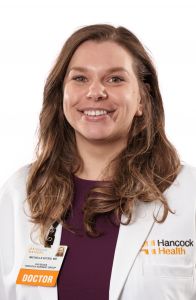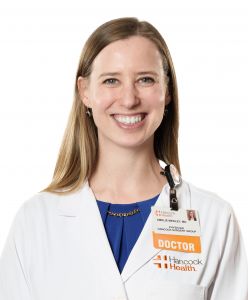
 When Dr. Michelle Kitsis steps into the operating room at Hancock Health, she brings more than her surgical skill. She also carries the same compassion and empathy for her patients, she hopes her children will one day embody.
When Dr. Michelle Kitsis steps into the operating room at Hancock Health, she brings more than her surgical skill. She also carries the same compassion and empathy for her patients, she hopes her children will one day embody.
“I have an 8-month-old and a 3-year-old — they don’t really know what’s happening, but as they realize mom has to leave, [I hope] they always understand that it’s for someone who needs me more,” Kitsis said. “I hope they see the value in taking care of other people and sacrificing things from your own life… I hope they grow up wanting to take care of other people in whatever way feels right for them.”
Kitsis joined Hancock Health as a general surgeon in August 2024. She and Dr. Amelie Medley, who joined in March 2025, are the health system’s two newest members of the surgical staff.
Kitsis’ interest in medicine began at 11 years old when her grandmother was diagnosed with colon cancer. Over the next five years, she watched her grandmother undergo treatment and an ostomy before eventually entering hospice and dying when Kitsis was 16. At the same time in her science classes, Kitsis found herself captivated by the complexity of cells and how countless tiny parts work together to keep the human body functioning.
“It’s mind-blowing when you look at the human body,” Kitsis said. “We’re a bunch of little cells that managed to coordinate in this way, and now, we can sit here on a phone, have a conversation, and understand each other.”
Like Kitsis, Medley’s family also played a role in her path to medicine. Medley grew up in a small rural community in Germany, helping at her father’s primary care office, where patients would come by even on Christmas Eve for care. She later assisted a family friend who was an anesthesiologist, where she observed a wide range of surgeries from ear, nose, and throat operations to implant procedures. These experiences inspired her desire to build personal relationships with her patients.
“It is important not to just see myself as a mechanic who just follows orders to put things in or take things out,” Medley said. “I put a lot of emphasis on having good discussions on the benefits of surgery, the expected risk, and I take a good look at the overall health of the patient to make sure that what I am doing will actually help them feel better.”
Choosing Hancock Health
From the moment Kitsis was greeted with smiles during her interview at Hancock Health, she could see the hospital’s emphasis on kindness in action, which ultimately inspired her to join the surgical team. It felt very special, she said, and was something she hadn’t experienced at other hospitals or during her medical school rotations. She saw that patients weren’t just another diagnosis walking through the door — they were entering a place where people genuinely cared.
Medley joined Hancock Health for its dynamic surgical team. She appreciates working alongside general surgeons Dr. Manuel Lozano and Dr. Jeff Heise, she said, learning from their decades of experience and mentorship while also collaborating with her younger colleagues.
As general surgeons, some common issues Kitsis and Medley both see regarding women’s health are hernias that develop from pregnancy, such as belly button hernias or incisional hernias after a cesarean section. They also help treat hemorrhoids, which affect nearly 40 percent of postpartum women, according to the National Institutes of Health.
Acid reflux is another issue Medley and Kitsis treat through Hancock Health’s Heartburn and Dysphagia Clinic, which specializes in Gastroesophageal Reflux Disease (GERD) and swallowing disorders. One in five U.S. adults has GERD, and one in 25 U.S. adults experiences a form of dysphagia in their lifetime, according to Yale Medicine and the National Foundation of Swallowing Disorders.
Certified in gastrointestinal and foregut surgery, Medley values helping patients who have tried medications and diet changes without lasting relief. She finds it rewarding when a straightforward surgery and short hospital stay can restore their quality of life, so they can sleep lying down and enjoy food again.
However, both Kitsis and Medley recognize the hardships women often face when it comes to prioritizing their own health and getting the care they need. They encourage patients to advocate for themselves, stand their ground, and find providers who take their concerns seriously.
“You can’t take care of other people if you’re not taking care of yourself,” Kitsis said. “As women, it’s easy to put ourselves on the back burner, waiting for a more convenient time. But problems don’t just go away — they tend to get worse with time. The sooner you get evaluated, the more options you have to manage symptoms with medication, and we don’t even have to consider any surgeries.”
Beyond the Operating Room
Both Kitsis and Medley believe that improving medicine and addressing the challenges patients face requires more perspectives and more voices in the field. For Kitsis, one pivotal moment came when she worked with a pediatric surgery fellow who was authentically herself and unlike anyone else she had seen in the surgical field. It showed her she didn’t have to model herself after the men she trained alongside.
 “You don’t have to change who you are, what you believe, or how you act in order to become a doctor — there is a place for you,” Kitsis said. “That was important to me, realizing that I didn’t have to change to provide the best service for people. I can continue to be myself.”
“You don’t have to change who you are, what you believe, or how you act in order to become a doctor — there is a place for you,” Kitsis said. “That was important to me, realizing that I didn’t have to change to provide the best service for people. I can continue to be myself.”
For Medley, the hardest part of her medical training has been leaving her home country and family behind. Because of the COVID pandemic, she said, she didn’t see her younger sister for almost five years.
Drawing on decades of his own healthcare experience, Medley’s father initially worried she might not fully understand the challenges of the profession, particularly for women, she said. Now, he sees that she enjoys her work, excels at it, and understands the impact she has on her patients, even when it’s demanding on her and her family’s personal lives.
Medicine can still feel like a boys’ club, Medley said, and prejudice against women persists in the field. Even so, she encourages women who want to be surgeons to pursue what they are truly passionate about — not just to prove others wrong.
“When you face adversity during training, put your head down, do the work, and let your work speak for itself,” Medley said. “Surgery is so demanding — it impacts my personal life so much, but you have to do what you really burn for.”
Because of the emotional weight of surgery, both Kitsis and Medley recognize how important it is to care for their own mental health. Medley said moments of joy with her husband and baby are what recharge her after difficult days. Being outside in nature also restores her, whether it’s hiking in Brown County or horseback riding.
Reading fantasy romance novels and learning to garden destresses Kitsis. These habits help her bring her best self to her patients at Hancock Health, she said, so she can help them feel more comfortable throughout their recovery after surgery.
“There are always difficult days — there are always things that don’t go the way you hope,” Kitsis said. “But working with people [at Hancock Health] who take the extra time to make sure things are done right, communicate clearly with patients, and make sure all their needs are met— that really helps people get better faster.”
To learn more about Dr. Kitsis, Dr. Medley, and Hancock Health’s general surgery team, visit HancockHealth.org.
Indy Maven has partnered with Gateway Hancock Health, which offers convenient immediate care services alongside family medicine, lab work, and imaging as part of the Hancock Health network. Learn more about our partnership here.
Nicole Thomas is a writer and digital marketer inspired by those making a difference in healthcare every day in Indianapolis. You can follow her on LinkedIn.
SUPPORT LOCAL JOURNALISM
All of our content—including this article—is entirely free. However, we’d love it if you would please consider supporting our journalism with an Indy Maven Membership.
P.S. Sign up for our weekly newsletter with stories like this delivered to your inbox every Thursday!




